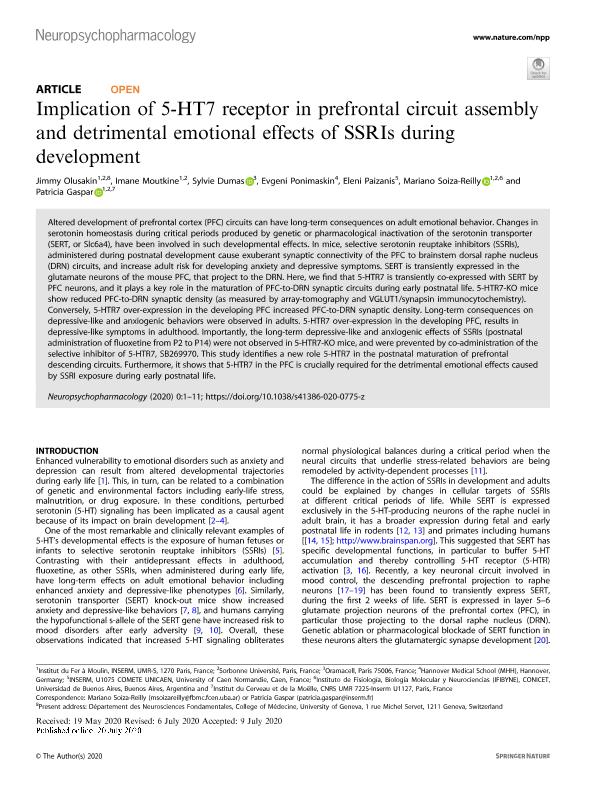Artículo
Implication of 5-HT7 receptor in prefrontal circuit assembly and detrimental emotional effects of SSRIs during development
Olusakin, Jimmy; Moutkine, Imane; Dumas, Sylvie; Ponimaskin, Evgeni; Paizanis, Eleni; Soiza Reilly, Mariano ; Gaspar, Patricia
; Gaspar, Patricia
 ; Gaspar, Patricia
; Gaspar, Patricia
Fecha de publicación:
20/07/2020
Editorial:
Nature Publishing Group
Revista:
Neuropsychopharmacology
ISSN:
0893-133X
Idioma:
Inglés
Tipo de recurso:
Artículo publicado
Clasificación temática:
Resumen
Altered development of prefrontal cortex (PFC) circuits can have long-term consequences on adult emotional behavior. Changes in serotonin homeostasis during critical periods produced by genetic or pharmacological inactivation of the serotonin transporter (SERT, or Slc6a4), have been involved in such developmental effects. In mice, selective serotonin reuptake inhibitors (SSRIs), administered during postnatal development cause exuberant synaptic connectivity of the PFC to brainstem dorsal raphe nucleus (DRN) circuits, and increase adult risk for developing anxiety and depressive symptoms. SERT is transiently expressed in the glutamate neurons of the mouse PFC, that project to the DRN. Here, we find that 5-HTR7 is transiently co-expressed with SERT by PFC neurons, and it plays a key role in the maturation of PFC-to-DRN synaptic circuits during early postnatal life. 5-HTR7-KO mice show reduced PFC-to-DRN synaptic density (as measured by array-tomography and VGLUT1/synapsin immunocytochemistry). Conversely, 5-HTR7 over-expression in the developing PFC increased PFC-to-DRN synaptic density. Long-term consequences on depressive-like and anxiogenic behaviors were observed in adults. 5-HTR7 over-expression in the developing PFC, results in depressive-like symptoms in adulthood. Importantly, the long-term depressive-like and anxiogenic effects of SSRIs (postnatal administration of fluoxetine from P2 to P14) were not observed in 5-HTR7-KO mice, and were prevented by co-administration of the selective inhibitor of 5-HTR7, SB269970. This study identifies a new role 5-HTR7 in the postnatal maturation of prefrontal descending circuits. Furthermore, it shows that 5-HTR7 in the PFC is crucially required for the detrimental emotional effects caused by SSRI exposure during early postnatal life.
Palabras clave:
PREFRONTAL CORTEX
,
SEROTONIN
,
GLUTAMATE
,
DEPRESSION
,
ANXIETY
,
SYNAPSES
Archivos asociados
Licencia
Identificadores
Colecciones
Articulos(IFIBYNE)
Articulos de INST.DE FISIOL., BIOL.MOLECULAR Y NEUROCIENCIAS
Articulos de INST.DE FISIOL., BIOL.MOLECULAR Y NEUROCIENCIAS
Citación
Olusakin, Jimmy; Moutkine, Imane; Dumas, Sylvie; Ponimaskin, Evgeni; Paizanis, Eleni; et al.; Implication of 5-HT7 receptor in prefrontal circuit assembly and detrimental emotional effects of SSRIs during development; Nature Publishing Group; Neuropsychopharmacology; 45; 13; 20-7-2020; 2267-2277
Compartir
Altmétricas



